Double-digit growth possible in engineering plastics – Sanjay Jain, DSM India
The global engineering plastics market is rapidly growing and the replacement of metal parts with engineering plastics is expected to continue to drive growth in the near future. The growing demand for engineering plastics can be attributed to their application in the automotive and electrical & electronics sectors and the relative ease with which they are able to meet customer specifications without compromising on quality.
The substantial growth potential in engineering plastics in India has over the years stimulated a steady rise in the number of global players entering the market. Among the first few to realize this untapped potential, Royal DSM — the global Life Sciences and Materials Sciences company — stands out owing to its commitment to sustainability and environmental protection through its portfolio of halogen-free engineering plastics.
In an interview with Lekhraj Ghai of POLYMERUPDATE, Sanjay Jain — Business Director, DSM Engineering Plastics India — discusses:
• DSM operations in India
• Sustainable practices adopted by DSM in India
• DSM Engineering Plastics manufacturing facility
• Importance of the automotive sector
• Impact of current global affairs on engineering plastics
• Outlook for the engineering plastics industry
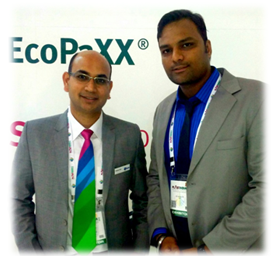
L to R: Sanjay Jain; Lekhraj Ghai (Photo: Manish Chaudhari)
Interview of Sanjay Jain (SJ) with Lekhraj Ghai (LG):
LG: Since when is DSM Engineering Plastics active in India? What are its products and solutions?
SJ: DSM Engineering Plastics has a focused portfolio of products, which include Akulon®, Arnite®, Arnitel®, Stanyl®, Stanyl® Fortii™ and EcoPAXX®. These are the trade names for polyamide 6, polybutylene terephthalate (PBT) and polyethylene terephthalate (PET), thermoplastic elastomer (TPE) based on polyester, polyamide 46, polyamide 4T and bio-based polyamide PA 4.10, respectively.
Formerly, Akulon, Arnite and Arnitel were products owned by the plastics arm of Dutch multinational AkzoNobel. DSM invented Stanyl in the early 1990s and with the intention of entering the market with a complete portfolio of engineering plastics solutions, DSM acquired the polyamides and polyesters plastics engineering businesses of AkzoNobel in 1992. With the acquisition of Cenka Plastics in 1999, DSM entered India as a fully owned legal entity. However, the DSM products and brand names, namely, Akulon, Arnite and Arnitel, have been present in India since 1982 through a joint venture that AkzoNobel had with Century Enka and subsequently through DSM Engineering Plastics.
LG: How competitive is the engineering plastics industry in India?
SJ: With India grabbing worldwide attention as a market with tremendous potential around 5–7 years ago, many of our global competitors started entering the engineering plastics business in India and competition gradually increased. Today, the engineering plastics market in India is highly cost-sensitive and is as competitive as any other global market. All western and eastern global engineering plastics players are now active in India in the engineering plastics domain. In addition, there is competition at the lower end of the business from local compounders as well. However, DSM's advantage lies in its approach, which is to aid market growth through application research and development, seeking opinions and working together with original equipment manufacturers (OEMs) and introducing plastic replacements for traditional metal and thermoset components.
LG: Tell us about the DSM Engineering Plastics facility in Pune. What is the employee strength of DSM in India?
SJ: DSM has a compounding facility at Ranjangaon in Pune, which plays a vital role in helping us deliver products and solutions to our customers. The world-class manufacturing facility started operations in January 2009. The plant produces compounds of thermoplastic polyesters and polyamides and is the largest engineering plastics compounding facility in the country. Our employee strength in DSM India is close to 900.
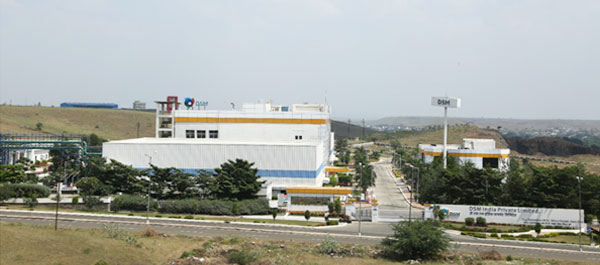
DSM's Engineering Plastics facility in Pune, India.
(Photo Courtesy: DSM Engineering Plastics)
LG: Could you enlist some of the sustainable measures adopted by DSM Engineering Plastics in India?
SJ: Sustainability is a core value of DSM and we try and replicate the DSM Triple PPP concept; i.e., People, Planet and Profit in our activities in India. "People" signifies improving lives through our activities, products and innovations and even the way we treat our employees, suppliers and customers. We measure how well we are faring on the "people" aspect by undertaking annual employee engagement evaluations and conducting customer satisfaction surveys. We also have employee suggestion schemes and a lot of inputs from our employees are utilized for improvement. Aspects such as energy reduction, renewable energy and waste management come under "Planet". We try to make our manufacturing processes more energy efficient and less wasteful without compromising on product quality. Today, about 30 percent less energy is consumed in our processes than that in 2009. We managed to achieve this by implementing energy saving measures like switching from fluorescent to LED lighting in our factory, ensuring that our machines and equipment are energy optimized and carrying out various improvement projects at the ground level. Furthermore, 50 percent of the energy that we use is based on renewable sources; 25 percent comes from our 1 MW solar farm and we procure the remaining 25 percent, which is based on wind, from outside. It is also critical to conserve water and we have managed to greatly minimize the water consumption in our processes from the levels of 2009. We are also deeply committed to waste reduction and there are policies in place for waste management. We try and locate wastages and employ various methodologies like Kaizen and 5S to reduce them. Finally, "Profit," which is critical for any business, is a measure of our economically viable activities, like the use of solar and wind power and biofuels while achieving commercial success. Our sustainable efforts to improve economic prosperity, environmental quality and social responsibility for the benefit of people, planet and profit is what the Confederation of Indian Industry (CII) was highly impressed with and after a 1000-hour on- and off-site audit, the DSM Engineering Plastics facility in Pune was presented with the CII ITC Sustainability Award 2014 for Excellence in Environment Management.
LG: Are there plans of DSM to expand within India?
SJ: India is a high-growth economy and expansion within India is very much at the core of DSM's business strategy. However, the growth of engineering plastics in India has been in single digits in the past 3–4 years and we are watching how the market unfolds to ensure that we invest and expand at the right time. As of now, we still have room to grow above our installed capacity in India. As soon as the market starts showing signs of sustainable growth, there would be more investments and more expansion opportunities.
LG: Is this wait and watch strategy influenced by the recent massive drop in the prices of crude oil and the ensuing uncertainty in the polymers market?
SJ: The engineering plastics industry is a bit distant from the oil industry. Crude oil prices have a more direct impact on commodity chemicals than on engineering plastics. Commodity polymers like polyethylene and polypropylene are distinctly correlated with the happenings upstream and their prices often run parallel to those of crude oil and naphtha. The current prices are indeed rather low and seem unsustainable. On the other hand, the engineering plastics business depends more on the inherent demand in the market and the massive drop in crude oil prices could possibly result in only a negligible impact on the engineering plastics business.
LG: What role does the automotive industry play in driving growth of engineering plastics?
SJ: The automotive industry is a very important growth driver for the engineering plastics business. India's automotive industry has exhibited slow growth in the last 5 years thereby lowering growth expectations, and at this moment we are a bit cautious in expressing optimism on the growth of the automobile industry in the country. Also, the amount of engineering plastics used in cars in India is substantially lower than that in Europe or even in China, possibly because the Indian automotive industry is more tilted towards one-box and two-box designs and A and B segment vehicles than the three-box design and C and D segment cars popular in European countries. Nonetheless, it is granted that the number of automobiles will go up and so will the use of engineering plastics in them.
In the automotive sector, our focus areas include high-temperature engine compartment components, auto electronics such as various sensors and car management systems and other structural components in the vehicle's frame or chassis. We work with all the major OEMs in the country to provide cost-effective engineering plastic solutions for automobiles. In addition, DSM has a strategic alliance with the Automotive Research Association of India (ARAI), a co-operative industrial research association established by the automotive industry and Ministry of Industries, Government of India. ARAI has been playing a crucial role in assuring safe, less polluting and more efficient vehicles to the Indian market. We have been working together with ARAI by combining our knowledge in the use of our materials in automotive applications and vast experience in integrating parts with engineering plastics with their expertise in automotive testing equipment, systems knowledge and vehicular standards to together bring new sustainable solutions for the automotive industry in India.
LG: Apart from the automotive sector, which other sectors is DSM Engineering Plastics involved with?
SJ: Electronics and electrical applications such as switchgear components, electrical appliances and lighting solutions have always been another major focus area for DSM Engineering Plastics. For example, there is presently a major change over from incandescent and even fluorescent lighting to LEDs owing to their lower energy consumption, longer lifetimes, higher efficiencies and reduced environmental impact. Specific requirements of the lighting industry such as heat management are expected to drive growth of engineering plastics in this sector. Infrastructure development plays a big role here as it demands consumption of lighting in roads, buildings and factories.
LG: What lies in the future for the engineering plastics industry in India?
SJ: Growth of engineering plastics is usually at a multiple of two times the gross domestic product (GDP) of a country. Taking into account India's promising economic outlook, we could be looking at a double-digit growth rate of 10–14 percent in engineering plastics. From that perspective, the engineering plastics business seems to be very attractive. The engineering plastics industry in India is fully deregulated and is highly promising from the viewpoint of an entrepreneur. With easy access to funds, anyone can put up a plant as long as they comply with the rules and standards for their products. Over the next 2–3 years, the engineering plastics industry will see a lot of new ideas and innovation. How many of those translate into business will ultimately decide the rate of growth of the engineering plastics industry.
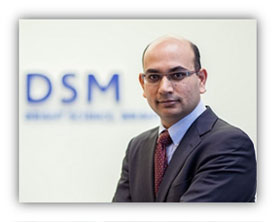
Sanjay Jain has over 15 years' experience with DSM - the Life Science and Materials Science company. He is Business Director of DSM in Engineering Plastics in India. DSM Engineering Plastics is a leading player in (bio-based) polyamides and polyesters serving the automotive, electrical and electronics, flexible food packaging and consumer goods industries. Before this role, Mr. Jain was Sales Director Compounds of DSM Engineering Plastics.
Prior to these roles, Mr. Jain was Product Manager of
Stanyl (PA46) within DSM Engineering Plastics and Business Development Manager. Mr.Jain holds a degree in Polymer
Engineering from the Maharashtra Institute of Technology.
END
For further information, commentary and interviews, please contact us on +(91-22) 61772000 and info@polymerupdate.com
ABOUT DSM – Bright Science. Brighter Living.™

Royal DSM is a global science-based company active in health, nutrition and materials. By connecting its unique competences in Life Sciences and Materials Sciences DSM is driving economic prosperity, environmental progress and social advances to create sustainable value for all
stakeholders simultaneously. DSM delivers innovative solutions that nourish, protect and improve performance in global markets such as food and dietary supplements, personal care, feed, medical devices, automotive, paints, electrical and electronics, life protection, alternative energy and bio-based materials. DSM's 24,500 employees deliver annual net sales of around
€10 billion. The company is listed on NYSE Euronext.
DSM Engineering Plastics is a global supplier of high-performance engineering thermoplastic solutions. It has a focused portfolio of products; with each of them it has realized global leadership. In India, DSM Engineering Plastics has been directly selling and manufacturing engineering plastics since 1999 with the acquisition of Cenka Plastics. DSM Engineering Plastics India started greenfield operation in Jan 2009 with a world class manufacturing facility. DSM continues to support its customer' drive to achieve increasingly ambitious sustainability targets. The company offers polyamides, polyesters and high performance engineering plastics. These products are used in automotive, electrical and electronics, packaging and outdoor power equipment.
DSM Engineering Plastics India delivers the complete global portfolio of its products Stanyl®, Stanyl® Fortii®, Arnitel®, Arnite®, Akulon® and EcoPAXX®.
ABOUT POLYMERUPDATE

POLYMERUPDATE is an online destination for the plastics and petrochemical industry, which specializes in providing market- moving information and pricing data on petrochemical products and industrial polymers. Global players seeking polymer market
intelligence rely on the real-time news and price alerts provided on POLYMERUPDATE for making informed business-critical decisions. POLYMERUPDATE covers a whole spectrum of products such as Crude oil, Naphtha, Aromatics, Olefins, Polyolefins and Petrochemical Intermediates. With almost two decades of extensive experience in garnering and providing business-critical content, POLYMERUPDATE has expanded its readership to more than 60 countries in the world and its pricing methodology is considered as a benchmark across South Asia. POLYMERUPDATE interviews and articles are a rich source of information on the latest trends in the chemical and petrochemical industry.
Visit POLYMERUPDATE on the internet at www.polymerupdate.com
Sign up for our newsletters
More like this

Plastics too valuable to throw away – An interview with Borouge's Laurence Jones Read More
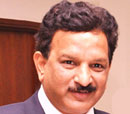
Ideal conditions for OPaL to enter market: Makarand Dixit Read More
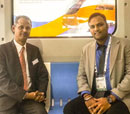
Comprehensive participation key for SABIC's growth in India: Janardhanan Ramanujalu Read More
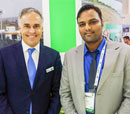
Global growth, global opportunities — An interview with Roelof Westerbeek, President - DSM Engineering Plastics Read More
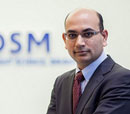
Plastindia Interview Snippets – A Special Feature Read More



